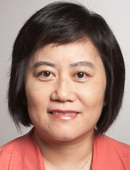
Shu-Hsia Chen, PhD
About Me
Language
English
Position
ADJUNCT PROFESSOR | Oncological Sciences
Research Topics
Anti-Tumor Therapy, Antigen Presentation, Autoimmunity, Cancer, Dendritic Cells, Gene Therapy, Hematopoiesis, Immune Antagonism, Immunological Tolerance, Immunology, Lymphoma, Microarray, Stem Cells, T Cells, Tolerance, Transplantation, Tumorigenesis
Multi-Disciplinary Training Areas
Cancer Biology [CAB], Development Regeneration and Stem Cells [DRS], Disease Mechanisms and Therapeutics (DMT), Immunology [IMM], Microbiology [MIC]
Education
BA, Soochow University
MS, National Yang-Ming Medical University
PhD, National Yang-Ming Medical University
Research
Publications
Selected Publications
- Male-biased Yap1-Cd276/B7-H3 axis for immune evasion in medulloblastoma. Nourhan Abdelfattah, Sivaraman Natarajan, Han Nhat Tran, Thomas Wong, Maryam Faisal, Jose Maldonado, Rachael McMinimy, Hannah Borland, Shu hsia Chen, Hong Zhao, Matthew Vasquez, Freddys F. Rodriguez, Carston R. Wagner, Fernando Camargo, James Olson, Joshy George, Kyuson Yun. Cancer Cell
- A visual–omics foundation model to bridge histopathology with spatial transcriptomics. Weiqing Chen, Pengzhi Zhang, Tu N. Tran, Yiwei Xiao, Shengyu Li, Vrutant V. Shah, Hao Cheng, Kristopher W. Brannan, Keith Youker, Li Lai, Longhou Fang, Yu Yang, Nhat Tu Le, Jun Ichi Abe, Shu Hsia Chen, Qin Ma, Ken Chen, Qianqian Song, John P. Cooke, Guangyu Wang. Nature Methods
- The safer effector cell? Potential of CD147 CAR NK cells to tackle tumors with lower toxicity. Alan Hodges, Shu Hsia Chen, Ping Ying Pan. Molecular Therapy Oncology
Industry Relationships
Physicians and scientists on the faculty of the Icahn School of Medicine at Mount Sinai often interact with pharmaceutical, device, biotechnology companies, and other outside entities to improve patient care, develop new therapies and achieve scientific breakthroughs. In order to promote an ethical and transparent environment for conducting research, providing clinical care and teaching, Mount Sinai requires that salaried faculty inform the School of their outside financial relationships.
Dr. Chen has not yet completed reporting of Industry relationships.
Mount Sinai’s faculty policies relating to faculty collaboration with industry are posted on our website. Patients may wish to ask their physician about the activities they perform for companies.